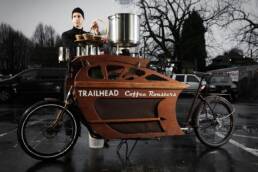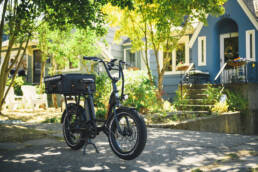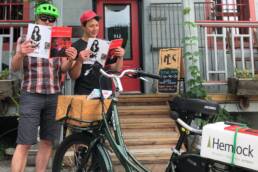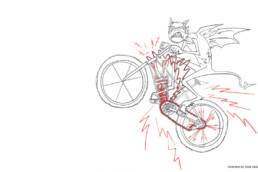From family members to freight, cargo bikes are helping city dwellers get their move on. By Susan Hollis.
It’s a touchstone of travel photography: bikes ladened down with kids, boxes and the occasional goat or chicken—the things North Americans typically stuff into cars. Things we are now starting to load onto our cargo bikes.
Although the Pacific Northwest will always be a car-dependent region, vast in its interminable roadways, the area still lends itself to two-wheeled travel. Cities like Victoria and Vancouver, British Columba, Seattle, Washington, and Portland, Oregon are moving towards improved and expanded bike lanes in their downtown cores. And cargo bikes—pedal bikes that have been extended and modified to carry all kinds of freight—are allowing residents to easily move more than what fits in a pair of pannier bags.
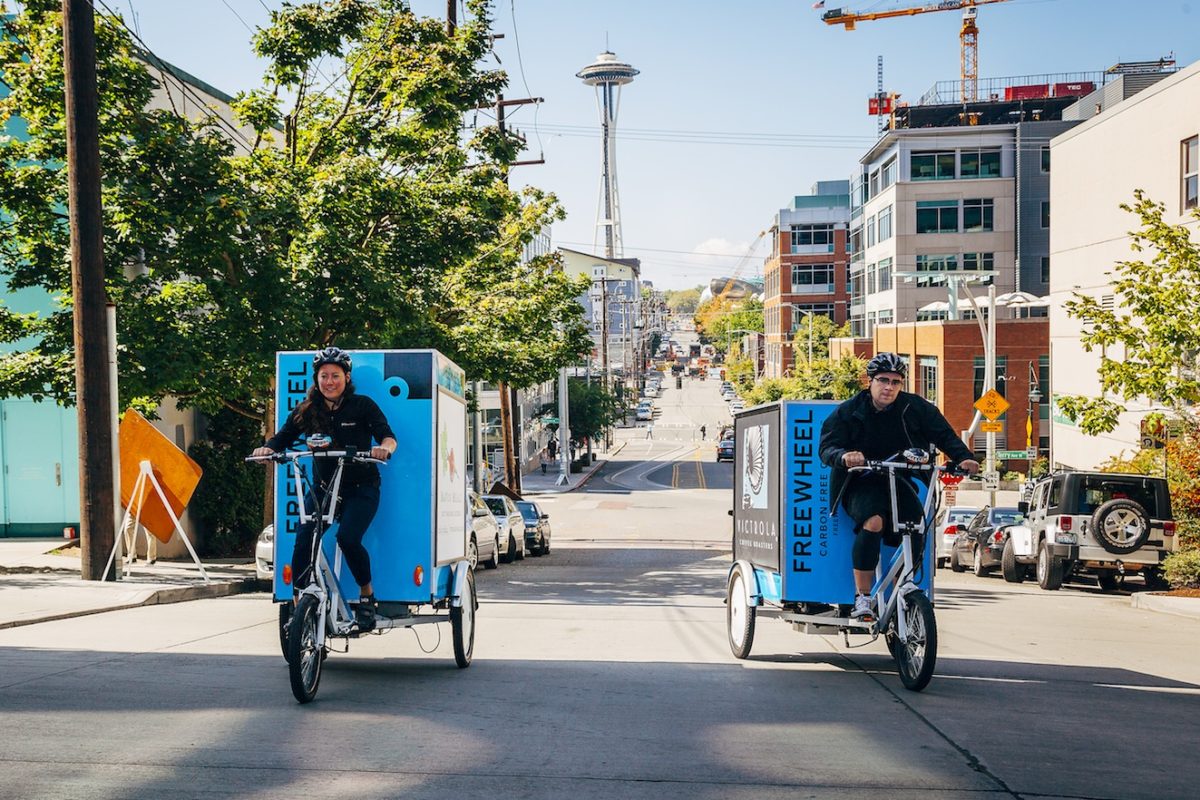
“Cargo biking didn’t exactly change my life, it enabled me to retain my life,” said Michelle Mark, a Victoria, mother with three young children. “The mundane becomes exciting—library time, groceries, returning empties, even going to school. Everything we do is an adventure. Plus, I don’t have to navigate busy parking lots with toddling children, because I can pull up right to the door.”
Cargo bikes are practical, and when practicality drives a movement, business is never far behind. At Victoria-based Geazone, two trike cargo bikes haul a lot of weight, notably kegs of beer.
It was a hot pizza and cool breeze that converted me to the idea. A week after we purchased a used Bakfiets—a brand of Dutch cargo bike with a long box between the handlebars and the front wheel—my husband met me at the village pub. They had stopped serving food, so he ordered a pizza and had it delivered before we left. He pedaled. I reclined in the front box with a pizza on my knees, cheese aromatics and beer-buzz lighting up the night. We cycled for hours and, as Instagram-worthy as the evening was, reality comes in the form of three kids under the age of five and a dog named Igor. The Bakfiets allowed us to sell our second car and dramatically reduce the use of our remaining vehicle, which we still avoid like the plague. When we got the bike, it occurred to me that North Americans rarely self-propel, unless for pleasure or exercise. Why not transportation?
“We deliver just about anything that will fit in our cargo boxes: office supplies, compost and recycling, dry cleaning, produce, beer,” said Shift Delivery co-founder, Robyn Ashwell, who runs her Vancouver B.C., co-op, courier company on cargo trikes. “From my observations, most of the things moving around downtown could be delivered by cargo bike or trike. I’ll often pull up behind a [delivery] truck and there will be only a few boxes that could easily fit in a trike. What are you doing downtown in this huge vehicle?”
Perhaps we should have one of these championships on the West Coast?
Shift Delivery moves roughly 1,600 kilograms (3,527 lbs) of goods each day in the downtown core, with each bike able to carry 226 kilograms (498 Lbs). In cities that are expanding bike lanes and mandating long-term, traffic-flow restrictions, companies like Shift, Portland’s B-Line and Seattle’s Freewheel Cargo have the upper hand.
They’re practical, and when practicality drives a movement, business is never far behind. At Victoria-based Geazone, founded by four-time national champion downhill mountain biker, Andrew Mitchell, two trike cargo bikes haul a lot of weight, notably kegs of beer.
“Cargo biking didn’t exactly change my life, it enabled me to retain my life.” — Michelle Mark, mother of three in Victoria, BC
“I have seen more [cargo] bikes on the road, but I anticipate, with a lot of the new rules coming in, that we will see that number significantly increase,” said Mitchell, who also runs a fleet of electric vehicles. “Older cultures have been using them for years because it’s so cost effective. You can’t get around the numbers of human beings versus fossil fuels. It is never as efficient.”
Manufacturers are keeping up with the movement, with most bike shops carrying ready-made, cargo bikes from companies like Urban Arrow, Bakfiets, Babboe, Xtracycle and Yuba. Venice Beach, California’s punk-courier-turned-cult-bike-builder Lane Kagay, of Cetma Cargo, has been refining custom, cargo bikes for years: now he ships them all over the continent. And despite being long-committed to a child-free life, he says his experience with Cetma motivated him to reverse his vasectomy.
“Since building these cargo bikes and interacting with my clients, who are mostly young parents and families, it kind of gave my wife and I baby fever, and we’ve decided to start a family,” he said with a laugh. “Seeing how transformative they are had a really transformative effect on me. I’d say that’s a big deal.”
Related Stories
Win This Rad Power Bikes Electric Bicycle!
There's something about biking in the fresh summer air. The wind on your face. The sounds of passerby. The fact you're…
KMC Magazine Using Electric Bikes For Local Delivery
Kootenay Mountain Culture magazine has started using electric bikes to do local deliveries. Mountain Culture Group and…
Electric Mountain Bikes: The Devil’s Tool?
From Whistler to Ymir to Europe, the debate over the electric mountain bike's impeding impact on your favourite…
A Life Ascending – Trailer
A new movie about the legendary Selkirk Experience guide, Ruedi Beglinger. Click the photo to check out the trailer. Or…
Life Cycles Is Almost Here
It's a decidely home-grown effort that will change the mountain bike film genre - and perhaps actions sports in general…


